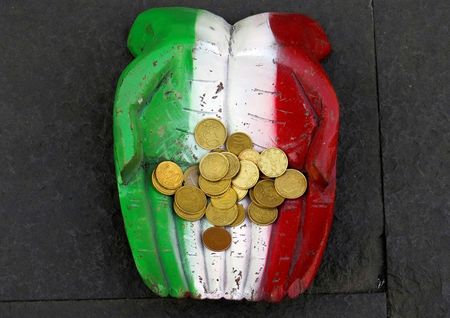By Gavin Jones
ROME (Reuters) - When Italy's centre-left Prime Minister Matteo Renzi took power in February by ousting his predecessor Enrico Letta in an internal party coup, he was expecting to benefit from a strengthening economic recovery.
After dismal data in recent weeks, that assumption now looks badly wrong and on Monday the Organisation for Economic Cooperation and Development forecast the economy would shrink for the third consecutive year and stagnate in 2015 as well.
The OECD slashed its growth forecast for Italy this year to -0.4 percent versus growth of 0.5 percent forecast in May, a far sharper cut than for any other Group of Seven economy, leaving Italy alone in negative territory.
The OECD's projection for this year is the lowest so far of any prominent monitoring body and its 2015 forecast of just 0.1 percent growth underscores the difficulties Renzi faces as he prepares the 2015 budget, to be presented by mid-October.
Renzi's approval ratings are still high, but the 39-year-old former mayor of Florence faces mounting criticism in the media and from business over the slow pace of reform. The centre-right opposition was quick to capitalise on the latest forecasts.
"This is the umpteenth confirmation that the government's economic policy is inadequate," said Mara Carfagna, a lower house deputy for Silvio Berlusconi's Forza Italia party.
Italy's main trade unions have vowed to take to the streets over Renzi's failure to cut record unemployment and protests are likely to intensify if he makes good on plans to slash public spending by 20 billion euros (15.90 billion pounds) in the budget.
The implications of the deteriorating economy for public finances are grim, and are compounded by falling prices which make it even harder for Italy to pay back its debt. Consumer prices fell 0.1 percent in August from the year earlier, the country's first taste of deflation since 1959.
RISING DEBT
Italy's debt-to-GDP stood at 133 percent of GDP at the end of last year, the second-highest in the euro zone after Greece, and is rising steadily due to the economic slump despite the government's efforts to keep a lid on spending.
Riccardo Barbieri, chief European economist at Mizuho, forecasts the debt will be equal to 136 percent of GDP at the end of this year, while Antonio Guglielmi, global strategist at Mediobanca, says it will hit 145 percent by the end of 2015.
In April, two months after taking office, Renzi forecast growth of 0.8 percent this year and 1.3 percent in 2015.
He said those forecasts were highly conservative and he expected positive surprises, partly thanks to an income tax cut for low earners and plans to quickly pay back arrears owed by the state to private suppliers, which would boost demand.
The bad news came almost immediately when data showed the economy shrank in the first quarter after emerging from a steep two-year recession at the end of 2013.
That was widely interpreted as a blip on the road to recovery until, last month, data showed GDP fell again in the second quarter, plunging Italy into its third recession in six years.

Ratings agency Standard & Poor's, which forecast zero growth for Italy this year, said in a report on Monday Renzi's stimulus measures "have had no effect so far on spending patterns".
(Reporting by Gavin Jones; editing by Andrew Roche)
